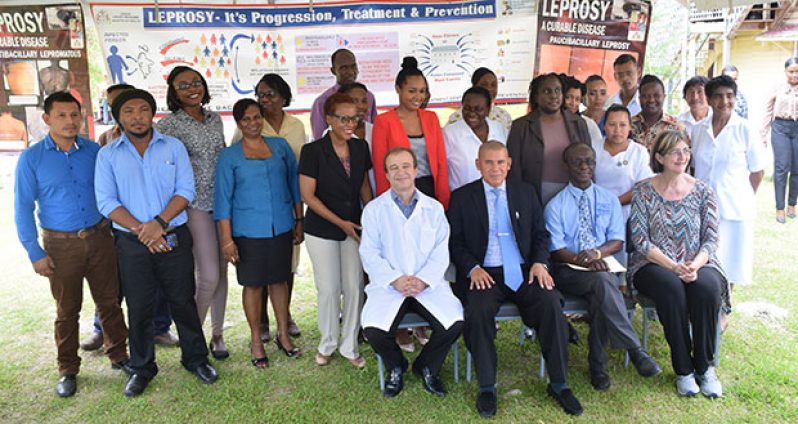THE National Leprosy Control Programme with technical support from the Pan-America Health Organisation (PAHO) on Wednesday launched a training programme to develop the capacities of health care workers to detect, treat and manage leprosy.While the five-day workshop is attracting health care workers from Region Four, the primary focus will be on those operating in Regions One, Seven, Eight and Nine. Head of the National Leprosy Control Programme, Dr. Heather Morris-Wilson will be assisted by US Occupational Therapist Linda Lehman and Leprologist Dr. Jaison Barreto of Brazil during the facilitation of the workshop.
Addressing key facilitators and beneficiaries of the programme at The Palms Geriatric Home, Public Health Minister Dr. George Norton said the capacity building workshop will boost the national programme.
He explained that as a result of the programme, the 20 participants will be better positioned to detect, treat and manage cases of leprosy, and also prevent and or minimize impairments.
While Guyana has long achieved the elimination of leprosy as a public health threat on a national level, Minister Norton said the fight continues to have the disease eliminated at a sub-national level. “Although the country sees a small number of cases each year, there is no room for complacency and that is a fact,” he emphasised.
PAHO/WHO Country Representative, Dr. William Adu-Krow, who was also present at the launching, pointed out that over the last two decades, Guyana has been reporting approximately 31 new cases annually – thereby reaching the target of leprosy elimination which is less than 1 per 10,000.
However, Dr. Adu-Krow noted that the sub-national elimination of Leprosy or the Hansen’s disease is still to be achieved as the leprosy control activities are not systematically implemented in the hinterland regions. As such, he said the workshop will focus on clinical and lab diagnosis of leprosy, assessment of disability and diagnosis, leprosy prevention and management and promotion of self-care.
“As a result of this training, the leprosy programme will extend its coverage to a national level by facilitating early detection of signs and symptoms of leprosy in all regions, also with other specialists screening households and reducing stigma and discrimination,” Dr. Adu-Krow said.
Additionally, he noted that the Public Health Ministry will now align its national strategy to the current Global Leprosy Strategy 2016-2020. However, he said in order to achieve the objectives of the strategy the Ministry must boost its resources.
Head of the National Leprosy Control Programme, in making her contribution, said the training is warranted to prevent undetected and untreated cases. Additionally, she said the programme will seek to create greater awareness. “People with leprosy have long been subjected to discrimination. There is a history of discarding people with leprosy on islands and being isolated on island sanatoriums in Japan,” she posited. Morris-Wilson said patients and even other members of the public must remember that leprosy is curable, treatment is free here in Guyana, and discriminating against people with the disease is wrong.
Morris-Wilson, however, noted that with the advent of multidrug therapy in the 1980s, leprosy has become a curable disease. Since then, some 16 million people have been cured.
Presently, there are less than 250,000 new cases of disease annually. “Guyana has also eliminated leprosy as a public health problem, the reduction of the prevalence to less than 1 case per 10,000 population, but this does not mean that we have to slacken our efforts in this regard,” she noted. Nevertheless, she said with the finance provided the unit will continue to raise awareness of the disease.
The capacity building workshop will come to an end on Friday when the 20 participants will return to their respective regions to execute that which was imparted to them.





.jpg)








